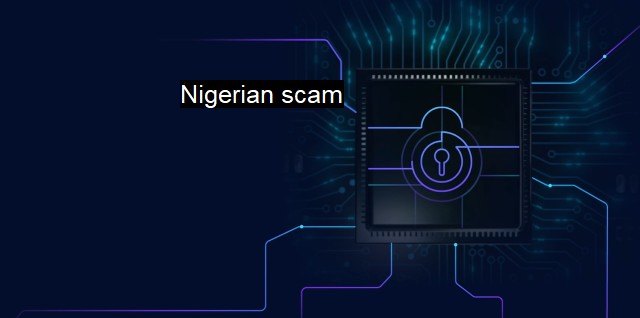What is Nigerian scam?
The Nigerian Scam: A Detailed Look at its Origins, Tactics and How to Guard Against this Growing Form of Cybercrime
The "Nigerian Scam", also known as the "419 Fraud," refers to an internet-born fraudulent scheme believed to be originating from Nigeria as far back as the 1980s. It is named after the 419 section of the Nigerian criminal code that deals with fraud. These frauds fall under the category of advance-fee fraud, wherein telecommunication networks are employed to dupe victims into making payments in advance for goods or services which they will never receive.These scams typically involve convincing victims that they are being offered a highly profitable, often secret deal, and victims are usually made to pay certain upfront transaction fees before they can receive their share of the proposed lump sum, which they never get.
The beauty of the "Nigerian Scam" is in its simplicity and the art of its execution. The criminals peddling these scams are known to be well versed in strategy, tricks, emotional persuasion and human psychology. With the advent of the Internet, email became their primary means of communication. It generally starts with an unsolicited email that appears official or comes forth as a cry for help, seeking the recipient's immediate attention. Often, the sender pretends to be a high-ranking official from a foreign government or a bank.
These criminally crafted emails come bundled with tales of woes, inheritance suits, treasure chests, and money laundering inquiries, all aimed to extract a wide range of fees including legal fees, taxes, bribes and lots more from the targeted individuals, with promises of an incredibly rich pot of gold at the end of the transaction.
In terms of cybersecurity, these spam emails are laden with phishing links and may include embedded viruses, malware and spyware, thus posing a severe threat. Unless these emails are detected by antivirus software and thrust into the spam folder, the user could be tempted to open the email, which could activate the hidden viruses.
Antivirus software is designed to capture and quarantine such malicious viruses and protect the system from any harmful infiltration. Strong and up-to-date antivirus software can mitigate a fair amount of these security risks. cybersecurity is not just the responsibility of antivirus softwares but also of individuals who should be aware of possible scams, spam and phishing schemes.
Early awareness and education about these scam techniques can safeguard users. It is essential never to share personal or financial information, never click on suspicious links, and remember the golden rule: if it's too good to be true, it probably is.
Reporting of such scams is crucial too. If the users suspect they've been targeted, they are encouraged to report to the local law enforcement or their national fraud information centre. International bodies such as the Nigerian Economic and Financial Crimes Commission and the U.S. Federal Trade Commission also work towards collecting and investigating these scam cases.
The advent of 'Nigerian scams' indeed presents a combined challenge for cybersecurity and antivirus defenses across cyberspace. It's a reminder that constructing concrete technical defenses in isolation is not enough; users must also be educated proactively and use sophisticated tools to defend against the continually evolving landscape of Internet scams. Hence, even though the "Nigerian scam" might seem like an old cliché in the lexicon of fraud, it continues to be a relevant chapter in the books of both cybercrime and cybersecurity.

Nigerian scam FAQs
What is a Nigerian scam and how does it work?
A Nigerian scam is a type of cybercrime where scammers, typically from Nigeria or other African countries, send fraudulent emails or messages to individuals or businesses. The messages usually promise large sums of money in exchange for a small fee, but once the fee is paid, the scammers disappear and the money is never seen again.How can I protect myself from Nigerian scams?
To protect yourself from Nigerian scams, it's important to be skeptical of any unsolicited messages or emails, especially if they promise large sums of money. Never give out personal information or send money to someone you don't know or trust. Use antivirus software and keep it up to date to help identify and block scam emails.What should I do if I suspect that I've been targeted by a Nigerian scam?
If you suspect that you've been targeted by a Nigerian scam, do not respond to the message or send any money. Instead, report the scam to the relevant authorities, such as your local law enforcement agency, the FBI, or the Federal Trade Commission. You can also report the scam to your email or messaging service provider.Are Nigerian scams only carried out by people from Nigeria?
Although Nigerian scams are often associated with scammers from Nigeria or other African countries, they can be carried out by people from any country. Scammers may use fake identities or locations to make it seem like they're based in Nigeria, but in reality, they could be operating from anywhere in the world. It's important to be cautious of any unsolicited messages or emails, regardless of the sender's location.| | A | | | B | | | C | | | D | | | E | | | F | | | G | | | H | | | I | | | J | | | K | | | L | | | M | |
| | N | | | O | | | P | | | Q | | | R | | | S | | | T | | | U | | | V | | | W | | | X | | | Y | | | Z | |
| | 1 | | | 2 | | | 3 | | | 4 | | | 7 | | | 8 | | |||||||